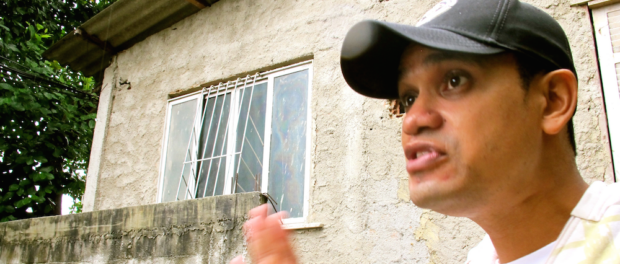
The Chapa Amarela campaign ticket won the Neighborhood Association elections on April 26 in the community of Babilônia, in Rio’s South Zone, with 394 votes. A total of 754 residents voted, choosing between the Chapa Amarela and the incumbent Chapa Verde, which won the remaining 360 votes.
Leader of the Chapa Amarela and newly elected president of the Residents’ Association, André Constantine celebrated the result as a chance “to rescue the association;” to bring transparency, bring unity and reinstate it as “a tool to fight to represent the aspirations and desires of the residents and not the public power.” André has become a well-known figure in favela advocacy circles for his impassioned speeches, historical references and proactive approach.
Residents of Babilônia echoed these desires, expressing disappointment with previous presidents and concern with previous corruption and inefficiency. Thiago, a business owner in Babilônia, said: “I hope the association gets better. There are a lot of things the last ticket did not do, so I am hoping the Chapa Amarela can do these things.”
André emphasized fighting corruption as a principal pledge of his presidency but was quick to stress this is a fight he wants to take to other communities around Rio. He believes his position as a “militant politician,” and as part of the Favela Não Se Cala (“the favela will not shut up”) movement means his campaign ticket has “a dimension which is a more macro view of the issues that happen in the city of Rio de Janeiro, because my view is not micro, it is not just focused on Babilônia.” He sees mutual solidarity as an intrinsic component of favela culture and has been an important figure supporting communities citywide in their struggles, especially against eviction.
“Unifying the fight of the favelas” is especially important at this moment, says André, because the city faces a housing crisis with widespread removals. A recent study identified Rio as the city with the largest increase in the cost of living worldwide over the last six years. He believes the favelas of Rio are all under threat, whether that be the threat of forced removals such as in Vila Autódromo or the process of gentrification sweeping the city and now affecting Babilônia.
Chapa Amarela intends to “soften” the impact of gentrification, which some argue will be “the biggest threat to favelas” in Rio in the future, by creating a territorial museum in the community. The members of the ticket want to take advantage of the media spotlight currently on Babilônia, due to the Globo network’s soap opera titled Babilônia, to pressure the City into funding an open-air museum, which will “rescue the origins of our identity as favelados.”
One of the first actions of the new Neighborhood Association was to organize a mutirão, or traditional day of collective action to resolve a local issue. During the cleaning event on May 24, André said: “Today we’re organizing the first of many mutirões that will follow. The mutirão…is a recovery of our history. If the favela exists to this day, it’s because it resisted. And one of the tools of resistance used by our ancestors when there was barely anything here, was the mutirão. And the mutirão isn’t just about bringing improvements or cleaning, it’s a recovery of our history. Recovery of the community spirit. Of solidarity, mutual support. So long live the mutirões! Long live Babilônia! Long live this new moment we’re living.”
The other principal threat the Association has identified to tackle is the seemingly arbitrary and drastic price increases by the electric utility Light. This has been a frequent complaint across favelas occupied by Pacifying Police Units (UPPs), and when investigated, RioOnWatch found “worrying evidence of systematic irregularities and abuses on its part.” With prices going up 100% in a month, André labeled the situation as a “monthly robbery” and demanded an explanation.
Long-term resident of Babilônia Alberto Antonio believes that Chapa Amarela could provide a new start for the Resident’s Association and hopes that its members can “help the community breathe, so that the community becomes safer and is open to dialogue.”

